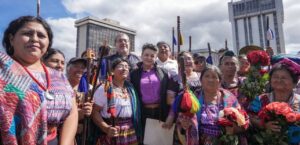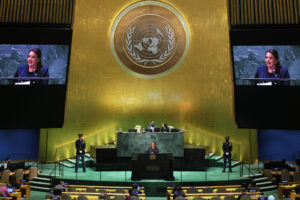WOLA's assessment on the pre-electoral situation in Nicaragua and possible US interventions.
To: Interested Colleagues
From: Maureen Meyer, Washington Office on Latin America
Re: Concerns about Nicaraguan Elections
Date: October 30, 2006
This coming Sunday, November 5th, federal and departmental elections will take place in Nicaragua. WOLA staff visited Nicaragua during the week of October 16-20th to assess the electoral situation, meeting with representatives of the U.S. government, Nicaraguan political parties, international organizations and bodies carrying out electoral observation missions, and civil society and non-governmental organizations.
It is clear that the electoral climate is tense although violence is unlikely. There are five parties with presidential candidates and the presidential election could be decided by a relatively small number of votes. The ability of the Supreme Electoral Council (CSE) to act impartially has been questioned. In this context, impartial national and international observation of the electoral process, the vote count, and the resolution of electoral challenges will be important in ensuring that the elections are free and fair.
The five presidential candidates are Daniel Ortega of the Sandinista Front for National Liberation (FSLN); José Rizo from the Constitutional Liberal Party (PLC), the party of former President Arnoldo Alemán; Eduardo Montealegre of the Nicaraguan Liberal Alliance-Conservative Party (ALN-PC), a break off from the PLC; Edmundo Jarquín of the Sandinista Renovation Movement (MRS), formed in 1995 by dissidents from the FSLN; and Eden Pastora, the candidate of the Alternative for Change (AC) party, who is an ex-Sandinista military commander who later fought with the anti-Sandinista “Contra” forces. Electoral law establishes that to avoid a run off election, the winner needs 40% of all votes, or 35% of the votes with a 5% lead over any other candidate. Ortega has been the leading candidate in most polls, which in recent weeks have positioned him near the 35% level, and with at least a 5 percentage point lead. If the election is close, there may be allegations of fraud and increased political tensions. Voter turnout is expected to be high.
In this context, it is important that U.S. officials both in Washington and in Managua make clear statements emphasizing that the major U.S. concern is that the elections be free and fair, and that the U.S is neutral regarding the outcome of the elections. While Embassy officials have made statements about U.S. neutrality, recent statements by Ambassador Paul Trivelli, U.S. Commerce Secretary Carlos Gutierrez, and Representative Dan Burton, among others, represent an intervention in Nicaraguan internal affairs and seem to contradict this position.
Background
These are the fourth federal elections held since Violeta Barrios de Chamorro defeated then-President Daniel Ortega in 1990, marking the end of the Sandinista Revolution (1979-1990). Many analysts have described the 2006 elections as unprecedented because they hold the potential to break up the power bloc of the two political parties that have dominated the Nicaraguan political system since the late 1990s. This bloc was consolidated when a political agreement, often called the “Pact”, or el Pacto, was reached between the PLC´s Arnoldo Alemán and the FSLN´s Daniel Ortega in 1999. Together, Alemán and Ortega commanded a substantial majority in the National Assembly, and they agreed to use their power to jointly assure PLC and FSLN control over key institutions such as the Comptroller General, the Supreme Court and the Supreme Electoral Council. Just as important, they agreed to legislative action providing them with protection from criminal prosecution. The two dominant parties also made it more difficult for small parties to contend in elections.
Over the last two years, the MRS and ALN, each of them formed by dissidents from the two main parties, have gained support as political alternatives. (Although Eden Pastora, candidate of the Alliance for Change, is a well-known political figure in Nicaragua, his political party has not received more than 1.5% of the votes in polls.) In the upcoming election, the four leading parties are all likely to win seats in the National Assembly and this raises the possibility of altering the control exercised by the PLC and the FSLN over the legislative branch.
In the presidential elections, Ortega has been leading in the polls and many analysts believe that in a five way race he could achieve the 35% and 5% margin that would make him President. (Polls suggest, however, that he would have a much harder time winning a majority in a two candidate run off.) Ortega continues to be a controversial figure, with strong sentiment either for or against him by many sectors of the population.
Eduardo Montealegre, who was foreign minister during the 1996 to 2001 Presidency of Arnoldo Alemán, has been consistently in second place in most polls. Montealegre broke from the PLC to run for office under the ALN-AC and he is widely viewed as being the favorite candidate of the U.S. government. José Rizo, the PLC candidate, has struggled to distance himself and the PLC from Arnoldo Alemán. . With the exception of a few polls, he has consistently been in third place in the elections.
The other main contender, Edmundo Jarquín of the MRS, was the party’s vice-presidential candidate until the untimely death of MRS Presidential candidate Herty Lewites, the former FSLN mayor of Managua, in July. The MRS lost momentum after the death of the popular Lewites but it continues to receive over 10% of the votes in the polls.
Given the significant errors in past presidential polls in Nicaragua, there is skepticism regarding the current predictions and many people are hesitant to declare any candidate as having the clear lead.
Concerns on the electoral process
On the technical level, there are no pressing concerns regarding the Supreme Electoral Council (CSE) and the apparatus in place for the elections on November 5th. On this level, many analysts feel that the 2006 elections will comply with international standards for free and fair elections.
Nonetheless, given the political tensions around these elections, there are several areas that could be problematic in the electoral process.
The composition of the electoral councils has given rise to concerns that the resolutions of electoral challenges may be biased in favor of the Pact parties. The FSLN and the PLC together hold the majority of seats on the CSE and all the lesser electoral councils – the Departmental or Regional Electoral Councils, the Municipal Electoral Councils and the local committees that manage each polling place (JRVs). In all of these three-member councils, either the FSLN or the PLC holds the Presidency and the other party the First Member seat. The only opportunity for representation within the councils for the other parties is through the Second Member seat (i.e. the third position in each of the councils). However, concerns have arisen regarding the designation of the Second Member. Seats were not assigned in an equal manner between the three remaining parties and the AC has gained many more seats than what would have been expected given it
s very low support among the electorate.
In addition, the lack of clarity in the norms established by the CSE to resolve electoral conflicts, particularly regarding when to open the ballot boxes and recount the votes, and when results from individual JRVs can be annulled, are also problems. If there are challenges to the vote counts at individual polling places, gaps remain in the criteria for CSE decisions, raising concerns that conflicts could be resolved based on partisan interests.
There are also concerns that irregularities could occur in the tabulation of the votes at the JRVs and in the transmission of the voting results from the JRVs to the other levels of the electoral councils. Finally, there are concerns about voter registration. In the weeks before the elections, the CSE had yet to distribute hundreds of thousands of national identification cards (cédulas) and supplementary voting documents (supletorios). If these documents are not distributed before the elections, an important part of the population (particularly those who are voting for the first time) will not be able to vote and suspicion may arise as to the biased distribution of these documents.
Election Observation
It is estimated that there will be over 15,000 national and international observers for the Nicaraguan elections. Coverage is expected to be broad and select national and international observations groups have been guaranteed access to all levels of the electoral institutions and computations center. Many observers will also be present to observe the election challenge process subsequent to voting day. The Nicaraguan organization Etica y Transparencia has the largest number of observers at over 11,000, while many other Nicaraguan civil society organizations are also carrying out electoral observation. Internationally, the OAS, the European Union, and the Carter Center all have large observation teams. The U.S. Embassy and USAID will also field a small team for election observation. Other delegations include those from the Latin American Council of Election Experts (CEELA) and the U.S.-based organization Witness for Peace.
Given the politicized climate of the Nicaraguan elections, WOLA believes that national and international electoral observation will be important in guaranteeing free, fair and transparent elections, especially during the vote count and in the resolution of electoral challenges.
The Role of the United States
The U.S. government through USAID is providing approximately $12 million dollars for support to the Nicaraguan elections. These funds have been distributed to the National Democratic Institute (NDI), the International Republican Institute (IRI) and the International Foundation for Election Systems (IFES) to support voter registration, civil education, electoral observation, quick counts, and technical assistance to the CSE. As part of this, IRI is training political party poll watchers, particularly for the MRS and ALN. Over $2 million of U.S. funds are also supporting the OAS Election Observation Mission. The U.S. role in supporting the elections process has been controversial. However, with the exception of IRI´s support for select political parties, WOLA did not see evidence that U.S. funded activities were supporting particular candidates or parties.
Statements from the U.S. Embassy and the Department of State affirm that the U.S. does not support any particular candidate and that it will respect any candidate who wins in free and fair elections. This stance, however, has been undercut by actions and remarks made by U.S. officials.
The U.S. Embassy in Nicaragua, and in particular U.S. Ambassador Paul Trivelli, has several times acted to urge the conservative parties in Nicaragua to unify behind a common candidate as a way to impede a Sandinista victory. Furthermore, U.S. Secretary of Commerce Carlos Gutierrez stated to Nicaraguan journalists in a videoconference on October 19, 2006, that a Sandinista victory could undermine Nicaragua’s economic relationship with the US. “It is not a secret that when this party was in power many years ago, the relationship with the United States suffered a great deal, and trade between both countries dropped significantly… These elections are very important and we want the Nicaraguan people to remember the important economic relationship between both countries and that this is not a moment to put this at risk.” Likewise, Congressman Dan Burton, Chair of the Western Hemisphere Subcommittee of the House’s Committee on International Relations, warned during his visit to Nicaragua in September that if Daniel Ortega was to be elected, the U.S. could cut its aid through the Millennium Challenge Account and that the country’s participation in CAFTA could be at risk.
These statements represent an intervention in Nicaraguan internal affairs that undermines democracy and undercuts the U.S. Embassy’s public expression of neutrality. In the days leading up to the elections, senior U.S. officials must clarify the U.S. position, and reaffirm that the United States government does not seek to interfere in Nicaraguan elections and that it will work with whomever Nicaraguans freely and fairly elect.
For more information, please contact: Maureen Meyer (202) 797-2171 mmeyer@wola.org


